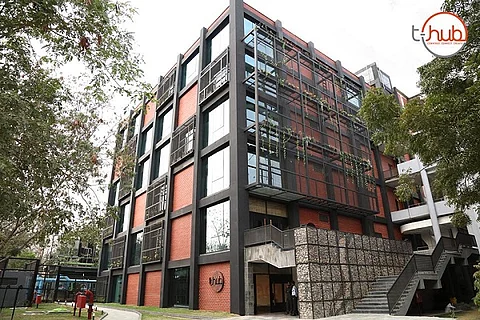

Days after KT Rama Rao took over as the IT Minister of Telangana, he drove down to IIIT-Hyderabad to meet a few professors to discuss what the government of Telangana could do to support innovation in Hyderabad – what the government should be focusing on to ensure Hyderabad becomes the startup capital of India.
Before the end of the day, one decision was taken – to set up a co-working space, an incubator, which will ensure innovation is fully supported by the state government.
What started off as a project to support innovation has now, two years later, become India’s largest startup incubator.
T-Hub was launched in November 2015 with the idea of helping technology-related startups by giving them a working space and access to mentorship, networking opportunities, and workshops for a nominal fee.
A startup in itself, T-Hub has grown leaps and bounds from being a co-working space for startups to creating an ecosystem involving startups, corporates, investors and academia not just from Hyderabad, but from across the globe.
KTR was once quoted saying “…at T-Hub, innovators, disruptors walk in with an idea and walk out with a product.”

Focusing on early and growth stage startups
While the idea largely remains the same, Jay Krishnan, CEO of T-Hub says one major pivot T-Hub has taken is from being an incubator for idea-stage startups to focusing on early and growth stage startups.
“That pivot was based on the fact that there are multiple classes of entrepreneurs who build solutions and it’s the market acceptance of that solution that allows differentiation between a hobby, a vocation and true business of a startup. Our pivot to early stage is predicated on that – market validation from the outside world,” he adds.
The extension of that is the growth stage when more people pay for it and there is organic growth coming in terms of traction and revenue. T-Hub now focuses on helping these startups scale and take their product or solution to the next level.

An eye on diversity
The second big pivot for T-Hub has been a focus on diversity and momentum. “If you look at mature ecosystems around the world, two things they have to offer are diversity and momentum. So we have started focusing on that. And our metrics of diversity have been gender, demographics, technology, types of ideas and people,” Jay says.
The idea has been to transform Hyderabad as one of the top 10 destinations. And to make people think of Hyderabad as a destination, T-Hub has introduced business units such as corporate innovation and international relations, and several programs such as T-Bridge, hackathons, virtual membership, India market access program. These programs are now attracting startups from different parts of the world to come to Hyderabad to participate in its programs. And that, Jay says, is bringing momentum and diversity.
Two years down the line, T-Hub has done a lot more than helping startups scale. Today, T-Hub has been associated with 835 startups, has on board 117 mentors, has enabled 32 community and 14 international partnerships, has conducted 13 startup-oriented programs and has seen 57 of its startups raise $33.6 million in funding.
Becoming a role model
But one of the biggest wins for T-Hub, according to Jayesh Ranjan, IT secretary of Telangana is that T-Hub has become a role model for Niti Aayog, which is looking to emulate its model.
KTR believes that T-Hub has acted as a catalyst in creating several incubators in Hyderabad. “There are 17 incubators in Hyderabad today focused on specific segments. This is the highest number of incubators a single city has in India,” he says.

BVR Mohan Reddy, founder of IT giant Cyient and founding director of T-Hub, agrees. He believes that T-Hub has created an ecosystem that ensures innovation. “We have created an ecosystem that ensures innovation becomes the DNA of the city of Hyderabad. T-Hub created that buzz and today there is incubator for innovation in eye care, one for agritech in ICRISAT, an incubator for biotech in IIT Hyderabad. These will eventually collaboratively make a difference,” he adds.
Jay also agrees to this that the benchmark for T-Hub’s success should not be a VC-type benchmark that looks at the amount of funding raised but to look at the ecosystem that has been built.
The challenges ahead
As T-Hub moves ahead in building a startup ecosystem in Hyderabad, the next big challenge for it, according to Jay, will be creation of employability. “This is a nationwide issue. But from a startup point of view, a lot of things that get solved are automation-driven. So the big challenge now at a macro-economic level will be how to provide employability,” he adds.

The team of T-Hub
The next challenge that T-Hub is taking on is gravitating startups towards focusing on technology to solve real Indian problems as opposed to emulating solutions that exist. “How do you look at startups who have good tech and push those ones as opposed to pushing all startups? That will be the next big challenge – a focused approach. And the answer to that is also automation. We are building our own tools, algorithms internally to filter out and see what the best startups are and help them,” he adds.
In two years since inception, T-Hub has become the largest incubator in India. The next step? To be amongst the top ten startup incubators in the world by 2020, says KTR. And with T-Hub 2.0 set to be launched in a year, T-Hub is already on the verge of becoming the largest incubator in the world.
As KTR said at the second anniversary celebrations of T-Hub, “The journey has just begun.”